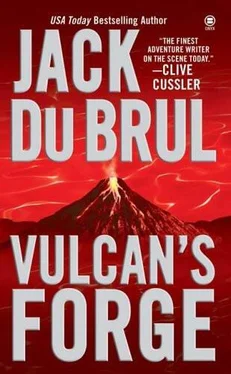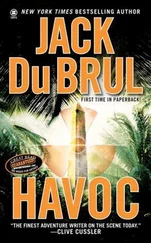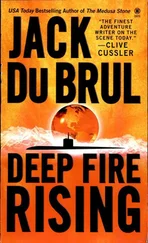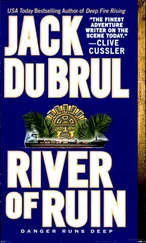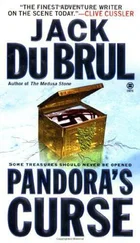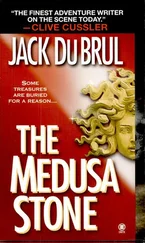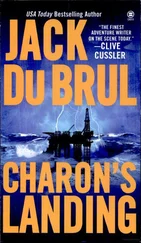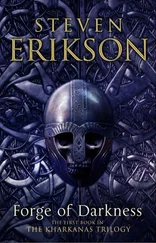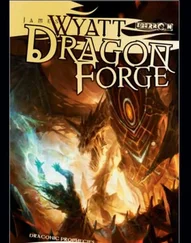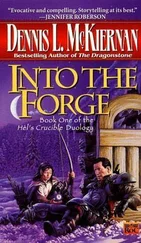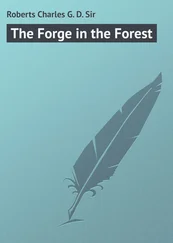Jack Du Brul - Vulcan's forge
Здесь есть возможность читать онлайн «Jack Du Brul - Vulcan's forge» весь текст электронной книги совершенно бесплатно (целиком полную версию без сокращений). В некоторых случаях можно слушать аудио, скачать через торрент в формате fb2 и присутствует краткое содержание. Жанр: Триллер, на английском языке. Описание произведения, (предисловие) а так же отзывы посетителей доступны на портале библиотеки ЛибКат.
- Название:Vulcan's forge
- Автор:
- Жанр:
- Год:неизвестен
- ISBN:нет данных
- Рейтинг книги:5 / 5. Голосов: 1
-
Избранное:Добавить в избранное
- Отзывы:
-
Ваша оценка:
- 100
- 1
- 2
- 3
- 4
- 5
Vulcan's forge: краткое содержание, описание и аннотация
Предлагаем к чтению аннотацию, описание, краткое содержание или предисловие (зависит от того, что написал сам автор книги «Vulcan's forge»). Если вы не нашли необходимую информацию о книге — напишите в комментариях, мы постараемся отыскать её.
Vulcan's forge — читать онлайн бесплатно полную книгу (весь текст) целиком
Ниже представлен текст книги, разбитый по страницам. Система сохранения места последней прочитанной страницы, позволяет с удобством читать онлайн бесплатно книгу «Vulcan's forge», без необходимости каждый раз заново искать на чём Вы остановились. Поставьте закладку, и сможете в любой момент перейти на страницу, на которой закончили чтение.
Интервал:
Закладка:
“I assume that all went well?” Kerikov moved toward Gennady so that he stood in the protection of the temple’s massive portal.
“Yes,” Gennady muttered. His fear of Kerikov, oppressive yesterday in the open crowd of the Royal River Hotel’s bar, was crippling now that the two were alone.
He had been terrified of Kerikov since learning of the KGB man’s unlimited influence so when he had shown up the day before, Kerikov had dismissed Gennady’s concerns over the missing maitre d’ and assured him that the time had come to wind up the Bangkok Accords. Gennady wanted to ask why the delay had been necessary in the first place, but fear froze the question in his throat. Even in the relaxed atmosphere of the open-air bar, Kerikov was the most malevolent man Gennady had ever seen.
“Relax, Gennady, it is done and you have triumphed.” Kerikov slipped a sterling hip flask from his jacket pocket. “Vodka from home.”
Gennady took a long pull from the flask. Even warm, the vodka went down his throat with the smoothness of silk. Kerikov motioned for Gennady to take another drink, and he did so gratefully.
“Tell me, were you able to insert my amendment into the accords?”
“Yes, that was done weeks ago. It was simple, really. I’ve had more difficulty in actually delaying the signing ceremony. I’ve made some promises to the Taiwanese ambassador that may be out of my bounds.”
“Yes, yes,” Kerikov said dismissively. “You had no trouble with my amendment, though?”
“The wording had to be changed some to accommodate the American, Donnelly, but they all agreed to it.”
“Changed?” There was no panic in Kerikov’s voice, but its pitch had raised slightly. “How?”
“I thought you’d ask, so I brought that section of the accords with me.” Perchenko pulled a sheet of paper from within his jacket and read aloud:
No sovereign nation has the right to claim additional land created through volcanism or coral buildup or any other natural process, i.e., not created by man, not within a two-hundred-mile line radiating from that sovereign nation’s territory. Any land created in this fashion is open to exploration and exploitation by any nation or other party which lays upon it first rights as laid down in Article 231 of this treaty. All contentions for said lands are to be settled by the World Court in The Hague.
“Donnelly wanted that last bit about the World Court in Holland.” Gennady took another swallow of vodka, waiting for a reaction from Kerikov.
Kerikov thought for a few seconds, letting Perchenko’s words soak in, then decided that the diplomat had followed close enough to the original wording. Thanks to that single amendment, Kerikov could turn over the volcano to the Korean consortium without any fear of international recriminations. The United States and Russia had just signed away any title to the volcano and its unimaginable wealth.
Kerikov did not betray his emotions to Perchenko when he spoke. “This is acceptable. Come, I have a boat waiting in the river; we will celebrate your success.”
Kerikov hurried Gennady away from the towering temple. They nearly sprinted through the driving rain toward the stone wall and the river beyond. Despite the water streaming into Gennady’s eyes, he could see enough to realize that there was no boat waiting at the quay. He had just turned to question the KGB man when Kerikov struck.
Kerikov moved with the speed of a mamba, smashing a short truncheon over Gennady’s head. Blood sprang from the wound over his left eye, mingled with the falling rain, and ran down Perchenko’s face in a pink sheet.
The diplomat crumpled to the ground in an untidy heap. Kerikov easily dragged Gennady to the low stone wall; the river beyond was as black as an oil slick. Hidden in some shrubs near the wall was a large plastic ice chest. Beside it were two large cement blocks connected by a chain. The chain was wrapped in soft cloth and its two ends were joined not by a padlock, but rather by the thick chunk of ice that nestled in the cooler.
Kerikov rubbed the falling water from his eyes. On a night like this he didn’t have to fear discovery by a casual stroller, but there was always a chance that a monk might come to the river to make an offering. He hoisted Gennady’s still-unconscious body onto the low wall; the diplomat’s breathing was shallow but even. Good.
After lifting the two cement blocks and the ice chest onto the wall, Kerikov slung the chain around Perchenko’s neck. He had to hurry — the ice was melting faster than he’d anticipated. Kerikov heaved the loyal ambassador into the turgid water. The dark river swallowed Perchenko with a minimal splash, the cement blocks dragging him quickly toward the bottom.
Kerikov threw the cooler in also and watched as it was washed away by the river’s subtle current, then started back to his hotel, shoulders hunched against the biting rain. He could imagine the police report when the body was finally discovered. Perchenko had been out celebrating the conclusion of his meetings; the alcohol in his system would show he wasn’t drunk but certainly tipsy. He had slipped in the rain near the river, smashed his head against the stone wall, and fallen in.
There would be no indication of foul play because the padding around the chain would leave no marks around his throat and the chain that anchored him to the muddy bottom while he drowned would have vanished. The ice that held it together would melt in about ten minutes and then Perchenko’s lifeless body would simply float free.
An hour later, Kerikov was seated in the living room of his hotel suite, showered and dressed in a conservative suit with a Scotch in his hand. He could hear the rain pelting the patio just outside the curtained French doors. The lighting in the elegant room was muted except for the lamp over the couch, which shone brightly on the papers spread across the coffee table. Kerikov had gone over them a dozen times in the past few days and felt he could recite them by heart. They were his ticket to a future outside Russia, a future that he had barely dreamed of.
The ice in the glass tinkled delicately as he took a sip. He placed the glass exactly onto its condensation ring on the glass-topped table and picked up a sheet of paper at random. It was the assay values of the mineral compiled by Dr. Borodin in his survey runs over the past few months. The figures were staggering. In one ton of mined volcanic material, eight pounds of usable ore were present. Processed, those eight pounds would produce about one pound of high-grade metal with all its extraordinary properties. By comparison, Borodin had explained that in open-pit diamond mining, 250 tons of overburden had to be removed per carat of diamond recovered, a ratio of one billion to one.
Kerikov selected another sheet of paper. This one was Borodin’s plan for the actual mining of the mineral. A ship fitted with a huge cycloidal pump would be stationed near a less active vent of the volcano. A tungsten steel tube would be lowered into the vent and the pump turned on. Lava would be drawn directly from the volcano into the ship, where it would be cooled and systematically broken up into workable chunks, which would be off-loaded onto waiting ore carriers for refinement at a land-based smelter. The only real cost in the mining operation was the pump ship and since selling the idea to the Koreans, they had already had the ship built in Pusan.
There was a knock at the door. Kerikov stacked the papers neatly, took another sip of Scotch, and went to answer it. Two young Orientals stood there, each holding a bulky suitcase. He let them in without a word.
The Koreans opened the suitcases, revealing a daunting mass of electronics. They hurriedly set up the equipment: camera, monitor, and computerized transceiver. One man placed a small collapsible dish antenna on the teak railing of the patio. From the street seventy feet below, the steel mesh dish was invisible.
Читать дальшеИнтервал:
Закладка:
Похожие книги на «Vulcan's forge»
Представляем Вашему вниманию похожие книги на «Vulcan's forge» списком для выбора. Мы отобрали схожую по названию и смыслу литературу в надежде предоставить читателям больше вариантов отыскать новые, интересные, ещё непрочитанные произведения.
Обсуждение, отзывы о книге «Vulcan's forge» и просто собственные мнения читателей. Оставьте ваши комментарии, напишите, что Вы думаете о произведении, его смысле или главных героях. Укажите что конкретно понравилось, а что нет, и почему Вы так считаете.
